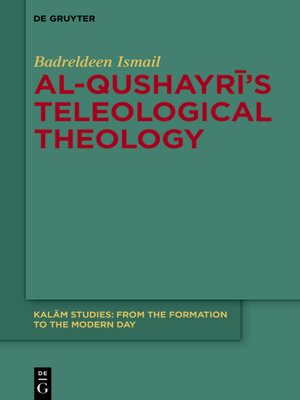
Sign up to save your library
With an OverDrive account, you can save your favorite libraries for at-a-glance information about availability. Find out more about OverDrive accounts.
Find this title in Libby, the library reading app by OverDrive.



Search for a digital library with this title
Title found at these libraries:
| Library Name | Distance |
|---|---|
| Loading... |
Abū al-Qāsim al-Qushayrī's (d. 465/1072) theological oeuvres remain eclipsed by his celebrated achievements in Sufism, with prevailing scholarly assertions that he is a mere repeater of Ashʿarite views and that his theology plays an apologetic role within al-Risālat al-Qushayriyya, anchoring its esoteric content to orthodoxy. Against this backdrop, the present study investigates al-Qushayrī's theology, in the light of intellectual developments in the fourth-fifth/tenth-eleventh centuries. His views are critically analysed on prominent epochal issues across his three most voluminous theological creeds, Lumaʿ fī al-iʿtiqād, al-Fuṣūl fī al-uṣūl and al-Risāla. Key topics include God's attributes; His relationship with man; and epistemological concerns. The thesis argues that al-Qushayrī's theology is, contrary to prevailing views, neither homogenous, nor entirely Ashʿarite. It reveals that his variegated theology is shaped by teleological forces. Al-Lumaʿ shows a traditionalist bent, whereas al-Fuṣūl is distinctly semi-rationalist. In al-Risāla, he lays the foundations of a mystical theology that governs the Sufi schema, whilst simultaneously delimiting the relevance of Ashʿarite doctrines to the mere confines of the masses.







